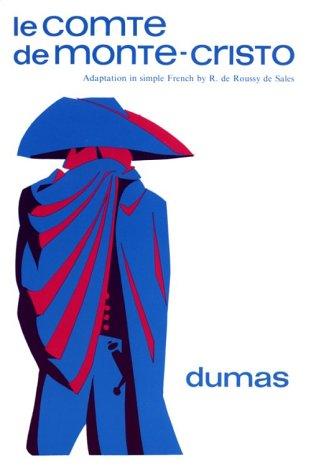Review of 'Count of Monte Cristo, The by Alexandre Dumas Leather Bound' on 'Goodreads'
4 stars
I went into this thinking it would be a hard slog. But things just do not stop happening the whole way through.

Paperback, 136 pages
French language
Published June 22, 1987 by NTC/Contemporary Publishing Company.
Au début du règne de Louis XVIII, Edmond Dantès est accusé à tort de trahison et enfermé dans la prison d'If, sur l'île du même nom, au large de Marseille. Après 14 années il réussit à s'échapper, et s'empare du trésor de l'île de Monte-Cristo, qui lui a été révélé par un compagnon de captivité. Devenu riche et puissant, il entreprend, sous le nom de comte de Monte-Cristo, de se venger de ses ennemis, qui l'ont accusé.
Au début du règne de Louis XVIII, Edmond Dantès est accusé à tort de trahison et enfermé dans la prison d'If, sur l'île du même nom, au large de Marseille. Après 14 années il réussit à s'échapper, et s'empare du trésor de l'île de Monte-Cristo, qui lui a été révélé par un compagnon de captivité. Devenu riche et puissant, il entreprend, sous le nom de comte de Monte-Cristo, de se venger de ses ennemis, qui l'ont accusé.
I went into this thinking it would be a hard slog. But things just do not stop happening the whole way through.
This book comes from an era where authors existed who could write intrigue correctly. Alexandre Dumas was one of these authors, and this fact is in full force in the Count of Monte Cristo. Everything is connected to the story, to character development, and even the plotting of that unhappy prisoner of the Chateau d'If.
Because of this, it is important to get an unabridged version of this classic. If you, as the reader, thought at any point, 'well, that was superfluous', you are wrong. If, at any time you said to yourself, 'well, this clearly was from a time where the author was paid for the word, not like today, guffaw' and then crack open the 12 volume in the current popular fantasy epic, you have no sense of irony. Understanding that Dumas doesn't waste a word and includes plenty of irony is essential. Edmond Dantes, though acting as …
This book comes from an era where authors existed who could write intrigue correctly. Alexandre Dumas was one of these authors, and this fact is in full force in the Count of Monte Cristo. Everything is connected to the story, to character development, and even the plotting of that unhappy prisoner of the Chateau d'If.
Because of this, it is important to get an unabridged version of this classic. If you, as the reader, thought at any point, 'well, that was superfluous', you are wrong. If, at any time you said to yourself, 'well, this clearly was from a time where the author was paid for the word, not like today, guffaw' and then crack open the 12 volume in the current popular fantasy epic, you have no sense of irony. Understanding that Dumas doesn't waste a word and includes plenty of irony is essential. Edmond Dantes, though acting as the avenging of angel of God, does not ultimately gain satisfaction in his vengeance. He carries it out because he believes he is delivering divine justice. Of course, things go wrong, and innocent people get hurt, people the Count is ultimately unable to save. In a sense, The Count of Monte Cristo can be viewed as a morality tale of what happens when you reject/betray God. Dumas seems to be saying that he does return, and will offer mercy to those who will accept it after he leaves them destitute... but if one does not depart from their wicked ways, they will only be used as tools to satisfy the thirst of righteous fury.
Or it can be read as a great adventure story about revenge, if you want to take everything so literally.






